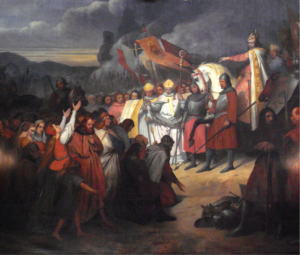
As our Medieval Poetry Project continues to expand into new territory, a section of the Old Saxon Hêliand (4665-4701), translated by Jake Coen, adds yet another medieval language to our project. Coen discusses his interest in this section form the much larger Old Saxon alliterative poem, which transforms and versifies the Gospel, in his translator’s preface.
Transcription Note: the present text was transcribed from a recent scholarly edition of the Hêliand published by Eric Vanneufville in 2008. Furthermore, key words pertaining to fidelity and lordship have been preserved in brackets in the translation alongside their English-language form.
Old Saxon Hêliand 56 (4665-4701)
“…Nu ni uuilliu ik iu leng helen
huat iu her nu sniumo scal te sorgu gistanden:
Gi sculun mi gesuikan, gesidos mine,
iuuues theganscepies, er than thius thiustrie naht
liudi farlitha endi eft lioht cume,
morgan te mannu.” Tho uuard mod gumon
suido gisuorken endi ser hugi,
hriuuig umbi iro herte endi iro herron uuord
suido an sorgun. Simon Petrus tho
thegan uuid is thiodan thristuuordun sprac
bi huldi uuiđ is herron: “Thoh thi all thit helitho folc” quathie,
“gisuican thina gisthos, thoh ik sinnon mid thi
at allon tharaƀon tholoian uuilliu.
Ik biun garo sinnon, ef mi god latiđ,
that ik an thinon fullestie fasto gistande;
thoh sia thi an carcaries clustron hardo
thesa liudi bilucan, thouh ist mi luttil tueo,
ne ik an them bendion mid thi bidan uuillie,
liggian mid thi so lieƀen; ef sia thines liƀes thann
thuru eggia nith ahtian uuillian,
fruo min thie guodo, ik giƀu min ferah furi thik
an uuapno spil: nis mi uuerth iouuiht
te bimithanne so lango so mi min uuarođ
hugi endi handcraft.” Thuo sprak im eft is herro angegin:
“Huat, thu thik biuuanis” quathie, “uuisaro treuuono,
thristero thingo: thu haƀis thegnes hugi,
uuillion guodan. Ik mah thi seggian huo it thoh giuuerthan scal,
that thu uuirđis so uuekmuod, thoh thu nu ni uuanies so,
that thu thines thiadnes te naht thriuuo farlognis
er hanocradi endi quithis that ik thin herro ni si,
ac thu farmanst mina mundburd.” Thuo sprac eft thie man angegin:
“Ef it gio an uueroldi” quathie, “giuuerthan muosti
that ik samad midi thi sueltan muosti,
doian diurlico, thann ne uuurthi gio thie dag cuman
that ik think farlognidi, lieƀo drohtin,
gerno for theson Iuđeon.” Thuo quathun alla thia iungron so,
that sia thar an them thingon mid im tholian uueldin.
“Peter’s Promise”: A Modern English translation by Jake Coen
“…Now I do not wish to withhold from you very long what problems shall soon befall you: you shall abandon me and your loyalty [theganscepies], my companions, before this dark night shall depart and shall come the light of morning to men.”
Then the minds of the men became darkened and their spirits sorrowful; their hearts mourned, and they worried greatly on account of their lord’s [herron] words. Simon Peter the loyal man [thegan] spoke then to his master [thiodan] with bold words of devotion for his lord: “Even if all these heroic men, your companions,” he said, “abandon you, still I wish always to suffer every tribulation with you. If my God allow it to me, I will always be steadfastly by your side; even if these people lock you away in prison chains, still I have little doubt that I would not wish to remain with you in those shackles and to lie with you, beloved so; and if they, out of hate, wish to take away your life by the sword, my good lord [fruo], I will give my life for you in the play of weapons [uuapno spil]: I shall surrender nothing so long as I have my spirit and the power of my hands!”
Then his lord [herro] spoke back to him: “Alas, you consider yourself to be of great loyalty [treuuono] and boldness,” he said. “You have the spirit of a loyal man [thegnes] and a good will. But I can tell you how it shall happen, that you shall become so weakminded—even though you do not believe so now—that you shall thrice forsake your master [thiadnes] this evening before the cock’s crow, and you will say that I am not your lord [herro] and that you reject my authority.”
Afterward, the man replied: “If it must be,” he said, “that I must perish with you in this world, that I must die in glory, still the day that I forsake you, beloved lord [drohtin], before these Jews will never come.” Then said all the disciples thus, that they wished to suffer with him there before the tribunal.”
Recitations by Jake Coen:
In Old Saxon:
In Modern English translation:
Jake Coen, PhD Candidate
University of Notre Dame
